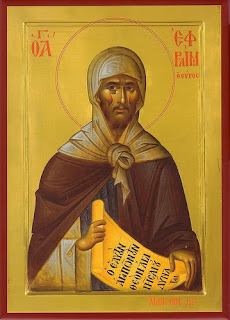READINGS OF THE DAY
Therefore, if you bring your gift to the altar,
and there recall that your brother
has anything against you,
leave your gift there at the altar,
go first and be reconciled with your brother,
and then come and offer your gift.
Saint Ephrem, Deacon
“If thou, O man, dost not forgive everyone who has sinned against thee, then do not trouble thyself with fasting. If thou dost not forgive the debt of thy brother, with whom thou art angry for some reason, then thou dost fast in vain God will not accept thee. Fasting will not help thee, until thou wilt become accomplished in love and in the hope of faith. Whoever fasts and becomes angry, and harbors enmity in his heart, such a one hates God and salvation is far from him.”
- St. Ephrem the Syrian
Early Church Father and Doctor of the Church
Life: St. Ephrem (also spelt Ephraem) the Syrian was a deacon who wrote his reflections almost exclusively in poetry, in the Syriac Aramaic language which was a dialect of the same language spoken by Our Lord and the apostles. He lived for most of his life in the city of Edessa, and wrote with such beauty on so many topics that he is regarded as one of the Doctors of the Church. Saint Ephrem died in the year 373 AD. His emphatic insistence on the absolute sinlessness of the Virgin Mary makes him an early witness of the Church's belief in Mary's Immaculate Conception.
--------------------------------------------------------------------------------

No comments:
Post a Comment